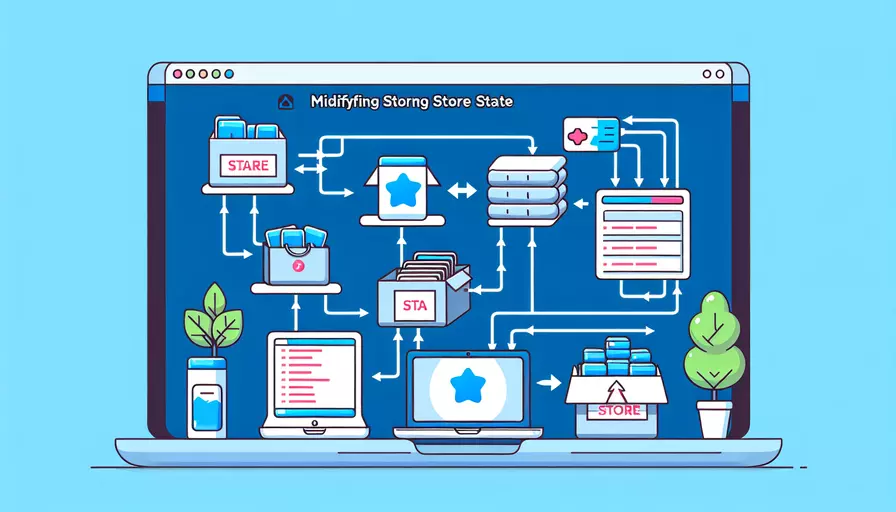
要在Vue中修改store状态,您可以通过以下几种方式来实现:1、使用store.commit()方法、2、使用store.dispatch()方法、3、直接修改store中的状态。以下将详细介绍如何通过这三种方式来修改store状态。
一、使用store.commit()方法
在Vuex中,mutations是用来同步地修改store状态的方法。通过调用store.commit()方法,可以触发一个mutation,从而修改store中的状态。
- 定义mutation:在store中定义一个mutation来修改状态。
// store.js
const store = new Vuex.Store({
state: {
count: 0
},
mutations: {
increment(state) {
state.count++;
}
}
});
- 触发mutation:在组件中,通过this.$store.commit()来触发mutation。
// Component.vue
<template>
<div>
<p>{{ count }}</p>
<button @click="increment">Increment</button>
</div>
</template>
<script>
export default {
computed: {
count() {
return this.$store.state.count;
}
},
methods: {
increment() {
this.$store.commit('increment');
}
}
};
</script>
二、使用store.dispatch()方法
在Vuex中,actions是用来异步地修改store状态的方法。通过调用store.dispatch()方法,可以触发一个action,从而修改store中的状态。
- 定义action:在store中定义一个action来异步修改状态。
// store.js
const store = new Vuex.Store({
state: {
count: 0
},
mutations: {
increment(state) {
state.count++;
}
},
actions: {
incrementAsync({ commit }) {
setTimeout(() => {
commit('increment');
}, 1000);
}
}
});
- 触发action:在组件中,通过this.$store.dispatch()来触发action。
// Component.vue
<template>
<div>
<p>{{ count }}</p>
<button @click="incrementAsync">Increment Async</button>
</div>
</template>
<script>
export default {
computed: {
count() {
return this.$store.state.count;
}
},
methods: {
incrementAsync() {
this.$store.dispatch('incrementAsync');
}
}
};
</script>
三、直接修改store中的状态
虽然不推荐直接修改store中的状态,但在某些情况下,您可能需要直接修改store中的状态。可以通过直接访问store.state来修改状态。
// Component.vue
<template>
<div>
<p>{{ count }}</p>
<button @click="incrementDirectly">Increment Directly</button>
</div>
</template>
<script>
export default {
computed: {
count() {
return this.$store.state.count;
}
},
methods: {
incrementDirectly() {
this.$store.state.count++;
}
}
};
</script>
需要注意的是,直接修改store中的状态会使得状态的变更难以追踪,可能会导致应用程序的状态管理变得混乱。
四、总结
在Vue中修改store状态主要有三种方式:1、使用store.commit()方法、2、使用store.dispatch()方法、3、直接修改store中的状态。通常推荐使用前两种方式,因为它们能够使状态的变更更加可控和可追踪。store.commit()方法适用于同步操作,store.dispatch()方法适用于异步操作,而直接修改状态则应该尽量避免使用。在实际应用中,根据具体需求选择合适的方式来修改store状态,以保证应用程序的稳定性和可维护性。
建议开发者在使用Vuex进行状态管理时,尽可能遵循Vuex的最佳实践,使用mutations和actions来管理状态的变更。同时,通过合理的模块化设计,将store拆分为多个模块,以便于管理和维护。
相关问答FAQs:
1. 如何在Vue中修改store状态?
在Vue中修改store状态需要通过Vuex来管理应用的状态。首先,你需要在Vue项目中安装并配置Vuex。在项目中创建一个store实例,该实例包含状态state、mutations、actions和getters等属性。然后,你可以通过调用mutations中的方法来修改store状态。
2. 如何使用mutations来修改store状态?
在Vuex中,mutations用于修改store状态。你可以在mutations中定义多个方法,每个方法都接受两个参数:state和payload。state表示当前的store状态,而payload是你传递给mutations方法的参数。
例如,假设你的store状态包含一个名为count的属性,你可以在mutations中定义一个方法来修改该属性的值:
// 在mutations中定义方法
mutations: {
increment(state, payload) {
state.count += payload;
}
}
// 在Vue组件中调用mutations方法
this.$store.commit('increment', 10);
上面的例子中,我们定义了一个名为increment的mutations方法,它接受一个payload参数,并将state.count的值增加payload的值。在Vue组件中,我们可以通过this.$store.commit方法来调用mutations方法,并传递一个payload参数。
3. 如何在actions中修改store状态?
除了使用mutations,你还可以使用actions来修改store状态。与mutations不同的是,actions中的方法可以包含异步操作。
在actions中定义的方法也接受两个参数:context和payload。context参数提供了与store实例相同的方法和属性,而payload参数则是你传递给actions方法的参数。
例如,假设你的store状态中包含一个名为user的属性,你可以在actions中定义一个方法来异步获取用户信息并修改该属性的值:
// 在actions中定义方法
actions: {
getUserInfo(context, payload) {
axios.get('/api/user/' + payload)
.then(response => {
context.commit('setUserInfo', response.data);
})
.catch(error => {
console.error(error);
});
}
}
// 在Vue组件中调用actions方法
this.$store.dispatch('getUserInfo', 1);
上面的例子中,我们定义了一个名为getUserInfo的actions方法,它接受一个payload参数,并通过异步请求获取用户信息。在获取到用户信息后,我们调用context.commit方法来调用mutations中的setUserInfo方法,从而修改store状态中的user属性。在Vue组件中,我们可以通过this.$store.dispatch方法来调用actions方法,并传递一个payload参数。
通过上述方法,你可以在Vue中灵活地修改store状态,并根据实际需求选择使用mutations或actions来实现。
文章标题:vue如何修改store状态,发布者:飞飞,转载请注明出处:https://worktile.com/kb/p/3673590

 微信扫一扫
微信扫一扫  支付宝扫一扫
支付宝扫一扫 